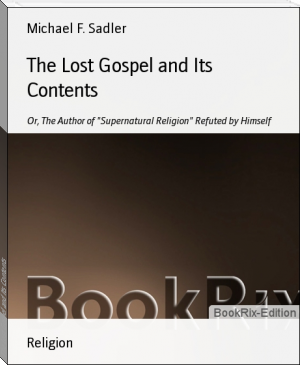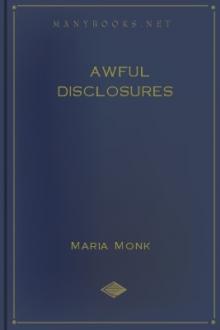The Lost Gospel and Its Contents - Michael F. Sadler (books to read for 12 year olds .txt) 📗

- Author: Michael F. Sadler
Book online «The Lost Gospel and Its Contents - Michael F. Sadler (books to read for 12 year olds .txt) 📗». Author Michael F. Sadler
of Christ, was the last place in which His Resurrection was likely to be promulgated.
[187:1] Miscellanies, IV. ch. xvii.
[193:1] Let the reader remember that, if this be an assumption, the contrary assumption is infinitely the more unlikely. Our assumption is founded on the direct assertion of two writers of the second century, one of whom asserts that Clement was a close companion of Apostles, another that he was an Apostle: meaning, of course, such an one as Barnabas. A writer of the early part of the next century, Origen, asserts that he was the person mentioned in St. Paul's Epistle, and the principal Ecclesiastical Historian who lived within two hundred years of his time corroborates this.
[194:1] "Ye ... were more willing to give than to receive" (ch. ii.). A reminiscence of St. Paul's quotation of Christ's words to be found in Acts xx. 35.
"Ready to every good work" (ch. ii). Titus iii. 1. "Every kind of honour and happiness was bestowed upon you (ch. iii). Reminiscence of I Corinth. iv. 8.
"Let us be imitators of them who in goat skins and sheep skins went about proclaiming the coming of Christ" (ch. xvii). Heb. xi. 37.
"To us who have fled for refuge to his compassions" (ch. xx.). Reminiscence of Heb. vii.
"Let us esteem those who have the rule over us." I Thess. v. 12, 13; Heb. xiii. 17.
"Not by preferring one to another." 1 Tim. v. 21.
"A future Resurrection, of which He has rendered the Lord Jesus the first fruits by raising Him from the dead" (ch. xxiv.). 1 Cor. xv. 20; Col. i. 18.
"Nothing is impossible with God except to lie" (ch. xxvii.). Tit. i. 2; Heb. vi. 18.
"From whom [Jacob] was descended our Lord Jesus Christ according to the flesh" (ch. xxxii.). Rom. ix. 5.
"For [Scripture] saith, 'eye hath not seen,'" &c. (ch. xxxiv.). Cor. ii. 9.
"Not only they that do them, but also those that take pleasure in them that do them" (ch. xxxv.). Rom. i. 32. Ch. xxxvi. contains distinct reference to Heb. i. I gave an extract above.
"Let us take our body for an example. The head is nothing without the feet ... yea, the very smallest members of our body are necessary and useful" (ch. xxxvii.), 1 Corinth. xii. 12, &c.
"Let every one be subject to his neighbour according to the special gift bestowed upon him" ([Greek: kathôs kai etethê en tô charismati autou]) (ch. xxxviii.). Rom. xii. 1-4; Ephes. iv. 8-12.
"The blessed Moses, also, 'a faithful servant in all his house'" (ch. xliii.). Heb. iii. 5.
"Have we not all one God and one Christ? Is there not one Spirit of grace poured upon us? Have we not one calling in Christ?" (ch. xlvi.). Ephes. iv. 4-6.
"And have reached such a height of madness as to forget that we are members one of another" (ch. xlvi.). Rom. xii. 5.
"Love beareth all things ... is long suffering in all things" (ch. xlix.). 1 Cor. xiii. 4.
[196:1] One is in amazement when one reads, in the work of a man who professes to have such a love of truth, the words, "The fact is, that we have absolutely no contemporaneous history at all as to what the first promulgators of Christianity actually asserted" (vol. i. p. 193). This writer, as far as I remember, gives us no reason to believe that he doubts the authenticity of St. Paul's earlier Epistles. Again, what is "contemporary history?" Surely, if a man was now to write the history of the Crimean war in 1854-5, it would be a contemporary history.
[199:1] Celsus, for instance, who had been some time dead when Origen refuted him, knew no other account than the one which he calumniated; Josephus the Jew knew no other, Trypho suggests no counter story. The wild exaggerations of the heretics refuted by Irenaeus all presupposed the one narrative, and can have had no other basis.
Imprint
[187:1] Miscellanies, IV. ch. xvii.
[193:1] Let the reader remember that, if this be an assumption, the contrary assumption is infinitely the more unlikely. Our assumption is founded on the direct assertion of two writers of the second century, one of whom asserts that Clement was a close companion of Apostles, another that he was an Apostle: meaning, of course, such an one as Barnabas. A writer of the early part of the next century, Origen, asserts that he was the person mentioned in St. Paul's Epistle, and the principal Ecclesiastical Historian who lived within two hundred years of his time corroborates this.
[194:1] "Ye ... were more willing to give than to receive" (ch. ii.). A reminiscence of St. Paul's quotation of Christ's words to be found in Acts xx. 35.
"Ready to every good work" (ch. ii). Titus iii. 1. "Every kind of honour and happiness was bestowed upon you (ch. iii). Reminiscence of I Corinth. iv. 8.
"Let us be imitators of them who in goat skins and sheep skins went about proclaiming the coming of Christ" (ch. xvii). Heb. xi. 37.
"To us who have fled for refuge to his compassions" (ch. xx.). Reminiscence of Heb. vii.
"Let us esteem those who have the rule over us." I Thess. v. 12, 13; Heb. xiii. 17.
"Not by preferring one to another." 1 Tim. v. 21.
"A future Resurrection, of which He has rendered the Lord Jesus the first fruits by raising Him from the dead" (ch. xxiv.). 1 Cor. xv. 20; Col. i. 18.
"Nothing is impossible with God except to lie" (ch. xxvii.). Tit. i. 2; Heb. vi. 18.
"From whom [Jacob] was descended our Lord Jesus Christ according to the flesh" (ch. xxxii.). Rom. ix. 5.
"For [Scripture] saith, 'eye hath not seen,'" &c. (ch. xxxiv.). Cor. ii. 9.
"Not only they that do them, but also those that take pleasure in them that do them" (ch. xxxv.). Rom. i. 32. Ch. xxxvi. contains distinct reference to Heb. i. I gave an extract above.
"Let us take our body for an example. The head is nothing without the feet ... yea, the very smallest members of our body are necessary and useful" (ch. xxxvii.), 1 Corinth. xii. 12, &c.
"Let every one be subject to his neighbour according to the special gift bestowed upon him" ([Greek: kathôs kai etethê en tô charismati autou]) (ch. xxxviii.). Rom. xii. 1-4; Ephes. iv. 8-12.
"The blessed Moses, also, 'a faithful servant in all his house'" (ch. xliii.). Heb. iii. 5.
"Have we not all one God and one Christ? Is there not one Spirit of grace poured upon us? Have we not one calling in Christ?" (ch. xlvi.). Ephes. iv. 4-6.
"And have reached such a height of madness as to forget that we are members one of another" (ch. xlvi.). Rom. xii. 5.
"Love beareth all things ... is long suffering in all things" (ch. xlix.). 1 Cor. xiii. 4.
[196:1] One is in amazement when one reads, in the work of a man who professes to have such a love of truth, the words, "The fact is, that we have absolutely no contemporaneous history at all as to what the first promulgators of Christianity actually asserted" (vol. i. p. 193). This writer, as far as I remember, gives us no reason to believe that he doubts the authenticity of St. Paul's earlier Epistles. Again, what is "contemporary history?" Surely, if a man was now to write the history of the Crimean war in 1854-5, it would be a contemporary history.
[199:1] Celsus, for instance, who had been some time dead when Origen refuted him, knew no other account than the one which he calumniated; Josephus the Jew knew no other, Trypho suggests no counter story. The wild exaggerations of the heretics refuted by Irenaeus all presupposed the one narrative, and can have had no other basis.
Imprint
Publication Date: 05-20-2008
All Rights Reserved
Free e-book «The Lost Gospel and Its Contents - Michael F. Sadler (books to read for 12 year olds .txt) 📗» - read online now
Similar e-books:





Comments (0)